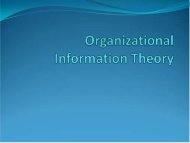Narrative Paradigm
Narrative Paradigm
Narrative Paradigm
- No tags were found...
Create successful ePaper yourself
Turn your PDF publications into a flip-book with our unique Google optimized e-Paper software.
<strong>Narrative</strong> <strong>Paradigm</strong>• Based on the work of Walter Fisher.• Humans are natural storytellers.• “We are persuaded more by a good story than a goodargument.”• <strong>Narrative</strong>s are universal.• <strong>Paradigm</strong> directing understanding of humancommunication.• Humans experience their lives in narrative form.
Assumptions1. Humans are naturally storytellers.2. Decisions about a story’s worth are based on“good reasons”.3. Good reasons are determined by history,biography, culture, and character.4. Rationality is based on people’s judgments of astory’s consistency and truthfulness.5. We experience the world as filled with stories andwe must choose among them.
<strong>Narrative</strong> <strong>Paradigm</strong>• The <strong>Narrative</strong> <strong>Paradigm</strong> is a <strong>Paradigm</strong> Shift, not amere theory.• Logos = reason• Mythos = story• Rhetoric, somewhere in between
<strong>Narrative</strong> <strong>Paradigm</strong>• The Rational World paradigm• Not all discourse is “equal”…• Aristotle held that only logos can lead to trueknowledge.• Scientific revolution – logic put into context of scienceand technology.• Overturned philosophy as the chief means toknowledge.• Poetics, rhetoric, mythos devalued
<strong>Narrative</strong> <strong>Paradigm</strong>• <strong>Narrative</strong> <strong>Paradigm</strong> –• a different way of thinking, incorporating philosophy,story, myth without sacrificing traditional rationality• No one has monopoly on knowledge, truth,reality…(Fisher)• …some ideas cannot be verified, proved in any absoluteway.• Logos <strong>Narrative</strong> <strong>Paradigm</strong> Mythos
<strong>Narrative</strong> <strong>Paradigm</strong>• Choosing stories (which are ubiquitous) to believebased on judgments regarding their coherence,consistency, veracity.• As Steven Colbert would have it, truthiness.
The Contrast<strong>Narrative</strong> <strong>Paradigm</strong>• Humans are storytellers.• Decision making andcommunication are based on“good reasons”.• Good reasons are determinedby matters of history,biography, culture andcharacter.Rational World <strong>Paradigm</strong>• Humans are rational beings.• Decision making is based onarguments.• Arguments adhere to specificcriteria for soundness andlogic.
The Contrast<strong>Narrative</strong> <strong>Paradigm</strong>• Rationality is based onpeople’s awareness of howinternally consistent andtruthful to lived experiencestories appear.• The world is experienced bypeople as a set of stories tochoose among.Rational World <strong>Paradigm</strong>• Rationality is based on thequality of knowledge andformal reasoning processes.• The world can be reduced to aseries of logical relationshipsthat are uncovered throughreasoning.
Narration• Narration – “symbolic actions (words and deeds) thathave sequence and meaning for those who live, createor interpret them.”• Not tied to particular media, genre, etc.• Is all communication narrative?• Some would say not.
<strong>Narrative</strong> <strong>Paradigm</strong>• Assumption of NP:• People accept/reject stories based on what makes senseto them, that is, “good reasons.”• People rely on personal instead of abstract (traditional)codes of argument.• Stories that resonate with personal experience are morecompelling than using objective, universal criterionregarding reason, logic, sound judgment
<strong>Narrative</strong> <strong>Paradigm</strong>• This is narrative logic, as opposed to traditional logic.• According to Fisher, narrative logic is moredemocratic, not the sole realm of the elites…• Objectivist / subjectivist issues?• Context determines how or what stories influencepeople (i.e., stories not universally persuasive)
<strong>Narrative</strong> Rationality• How to judge and make sense of the stories.• Coherence• Structural Coherence(flow)• Material Coherence (congruence among stories)• Characterological Coherence (believability of characters)
<strong>Narrative</strong> Rationality• Fidelity• Ringing true• Resonates with social reality• Possesses the logic of good reasons (set of values used toassess fidelity)
Five Questions – Part 1• Five Questions (about the narrative):1. Are the statements that claim to be factual in thenarrative really factual?2. Have any relevant facts been omitted from thenarrative or distorted in its telling?3. What are the patterns of reasoning that exist in thenarrative?4. How relevant are the arguments in the story to anydecision the listener may make?5. How well does the narrative address the important andsignificant issues of this case?
Five Questions – Part 2• Five Questions (about the values):1. What are the implicit and explicit values contained inthe narrative?2. Are the values appropriate to the decision that isrelevant to the narrative?3. What would be the effects of adhering to the valuesembedded in the narrative?4. Are the values confirmed or validated in livedexperience?5. Are the values of the narrative the basis for idealhuman conduct?
<strong>Narrative</strong> <strong>Paradigm</strong>• Methods of understanding• Movies vs. documentaries• Commercials for local vs. satellite radio (what method isused, RWP or NP?)• Merely a quant/qual balance or something more?
Critique of NP• Scope and Testability• As a “paradigm” it’s immensely broad and so hard (orimpossible) to test or falsify.• What does it mean to have “everything” be narrative?• There are good ones and bad ones, but both get elevated to“narrative.”
Critique of NP• Utility• NP said to have a built-in conservative bias.• We only go along with stories that confirm the way we alreadylive.• So how can new, socially changing, stories get in? (bychanging our values)• What about the unstated and unexamined biases in thestories we already tell ourselves?
Critique of NP• Logical Consistency• Is it as democratic as Fisher claimed?• Do the “elites” control the stories?• How can marginalized peoples get their stories told?• Heurism• A lot has been done with NP• Most of the problems seem more a matter of extendingthe paradigm.
Discussion Points• Humans as storytellers vs. rational beings (does it have to one orthe other)?• Can we get by on decisions based on merely “good reasons”, asopposed to arguments?• How large should the role of history, biography, culture,character in arriving at these reasons, as opposed to weighingarguments based on logic?• Rationality – how it jibes with life experience vs. quality ofknowledge, formal reasoning?
Where Do You Stand?• Truth through rational analysis (RWP) or emotionalresponse to compelling stories (NP)? (p.379)
<strong>Narrative</strong> <strong>Paradigm</strong>• Political candidate – two options regarding communicationof environmental record• Voting record, knowledge of environmental issues, extent andsuccess of activism, ownership of business (and its record onenvironment), endorsements from credible authorities onenvironment• OR• Story of young man/woman growing up in small mountain hamlet– lived with family off the land, volunteered for Sierra club inschool, saved wounded animals, worked at vet’s office, organizedsafaris, spoke at Earth day conference, wrote poetry with favoriteauthor being Emerson, uses recycled paper in office.
<strong>Narrative</strong> <strong>Paradigm</strong>• Political candidate – two options regarding communicationof environmental record• Analysis based on objective information using fairlystandardized criteria, arriving at universally applicableanswers• OR• Coherent story with internally consistent theme (cares forenvironment), good structural flow (stages of growthaccounted for), all anecdotes hang together well (goodmaterial coherence), and all the characters, stories arebelievable. Appeals to values and accurately represents socialreality – good reasons leading to fidelity.
<strong>Narrative</strong> <strong>Paradigm</strong>With your political candidate, what narrative approach wouldyou take with the following issues, and how would youcommunicate them to the following demographics?(How will you establish coherence, fidelity, etc.)Where is your emphasis and to whom, particularly if you aretrying to avoid contradicting yourself?• Education• Environment• Taxes• Foreign Policy• 18-24• Gender• Senior Citizens• Naturalized Citizens


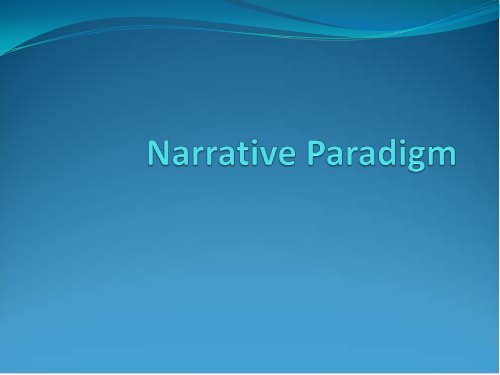
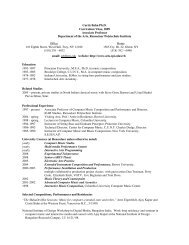

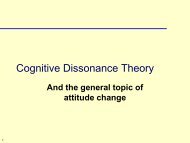

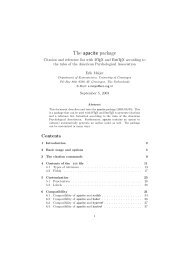
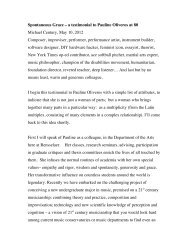

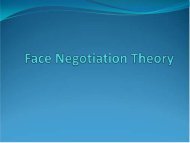


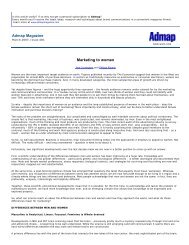

![The Game Design Document [.pdf]](https://img.yumpu.com/30117124/1/190x245/the-game-design-document-pdf.jpg?quality=85)
